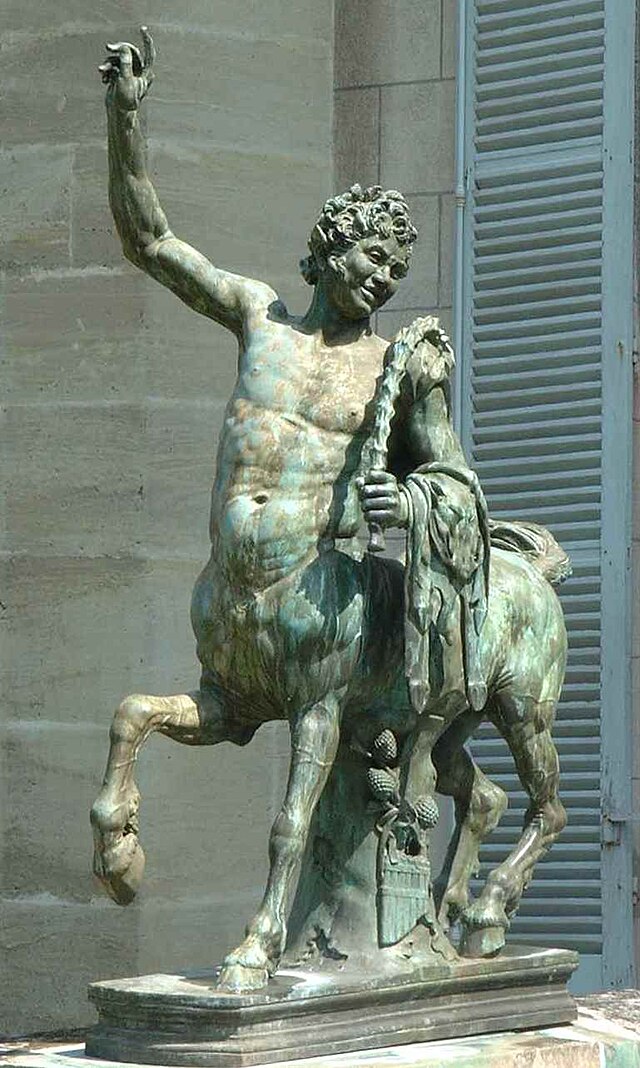Yet they are also symbolic of the countryside and everything people trapped in urban environments long for.
The Ancient Greeks once worshiped river gods who appeared as bulls with human faces or horses, and very likely as horses with human bodies, known as centaurs. Of course as time went on this role began to change, yet they were still very often associated with rivers and the sudden potential for violence.
A great example of what Centaurs essentially became comes from the tale of Nessus and Hercules.
In this tale Nessus is forced to flee his home as a result of the battle with the Lapiths, to the river Euenos where he makes his living ferrying people back and forth across the river on his back. Hercules hires him to bring his wife across this river and he becomes enamored with her. While he's trying to rape her she cries out for help and Hercules shoots him with an arrow. As he lays dying he tells Deianeira that his blood will act as a love charm to ensure that Hercules is always faithful. This, however, is a lie as his blood is poisonous and it ultimately leads to Hercules's death.
There is a lot going on in this little blip of a story.
The first part of Nessus's tale is that he was invited to the wedding feast of Pirithous with the Lapiths (humans). At first everything was going smoothly but with the mixture of wine and revelry the centaurs wild nature asserted itself. One of the centaurs attempted to rape the bride and all chaos broke out. The centaurs began raping women and boys, leading to a battle which the centaurs ultimately lost.
Nessus flees from this nightmare and tries to establish himself as a legitimate member of human society once more. He doesn't run off into the wild and live off the land. He doesn't become a bandit. Instead, despite his animal half, despite his wild nature which he seems to be unable to control, he puts himself in a position to work for people, to be with people. Far from trying to pretend that he doesn't have a horse half he embraces it by working as a mount for people.
However, he is still a wild being of nature and so ultimately looses control again and this time it leads to his death.
He is not a straight forward villain, however, Centaurs in general are ambiguous figures, being at once both savage and symbols of the beauty and wonder of the countryside. They are both dangerous and friendly. This fits into R. R. Martin's idea that characters should be both good and evil. As he states about his books; “Like much fantasy, it's concerned with the battle of good versus evil, but where I think I differ from a lot of other fantasists is, in my view, the battle between good and evil is waged every day within the individual human heart.”
Centaurs must struggle with themselves and their own nature, their own conflicting desires. They are forever caught in the period even before the darkest ages of Greece. They are half animal, half wild and savage. Yet at the same time they find themselves trying to survive in a world dominated by humans who are trying to live according to the philosophies of the cities (and who are often failing themselves).
It's easy of course to focus on their failures, on Nessus's last acts of violence and the events that lead to the battle of Lapith. Yet there are successes too. There is a reason to hope, even if it's very slim.
Chiron was very much like a centaur in appearance yet his lineage in mythology is different, so he's not exactly the same as they are. Of course Greek lineage is notorious for the fact that it constantly changed. So it's always possible that Chiron was originally a centaur and I like to think of him as such. Why? Because, it's nice to think that one of the centaurs overcame their violent nature, happily married a nymph, had children, and acted as a doctor and philosopher.
In the end, like centaurs we must perhaps all struggle with a darker nature, with a side of ourselves we don't want to have. We must all live with things we regret doing. This is what makes centaurs so interesting, because unlike most enemies in a fantasy world they might have certain tendencies, tendencies that they struggle with and rarely succeed in overcoming but like us they have a desire to overcome them.
So as a villain tribes of centaurs or individual centaurs tell us something important about human nature and the nature of evil acts. Many evil acts are surrounded by a desire to be more than the sum of one's compulsions. At the same time controlling these compulsions can be next to impossible, driving many to eventually embrace them.
The centaur could also fit within Miyazaki's notion that one can't simply destroy something good or evil, one must learn to accept. This was the moral of his movie "Princess Mononoke" in which both sides were essentially good but they both did wrong things.
So even if your villain isn't a centaur, there is perhaps still something we can learn from them about people who are forever caught between two natures, two worlds.














0 comments:
Post a Comment